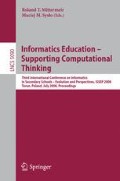Abstract
The paper presents an analysis of the learning objectives that have to be achieved in order to learn Object Oriented Programming. By using the prerequisite relation between these objectives we develop a sequence of concepts for a textbook. The article is closed by some considerations concerning the electronic management of learning objectives using ontologies.
Access this chapter
Tax calculation will be finalised at checkout
Purchases are for personal use only
Preview
Unable to display preview. Download preview PDF.
References
Anderson, L.W., Krathwohl, D.R. (eds.): A Taxonomy for Learning, Teaching, and Assessing: A Revision of Bloom’s Taxonomy of Educational Objectives. Longman, New York (2001)
Duffy, T.M., Jonassen, D.H. (eds.): Constructivism and the Technology of Instruction: A Conversation. Lawrence Erlbaum, Hillsdale (1992)
Frey, E., Hubwieser, P., Winhard, F.: Informatik 1. Objekte, Strukturen, Algorithmen. Klett, Stuttgart (2004)
Hubwieser, P.: Functions, Objects and States - Teaching Informatics in Secondary Schools (ISSEP 2006, Vilnius, Litauen). In: Mittermeir, R.T. (ed.) ISSEP 2006. LNCS, vol. 4226, pp. 104–116. Springer, Heidelberg (2006)
Hubwieser, P., Schneider, M., Spohrer, M., Voß, S.: Informatik 2. Tabellenkalkulationssysteme, Datenbanken. Klett, Stuttgart (2007)
Hubwieser, P.: A smooth way towards object oriented programming in secondary schools. In: Benzie, D., Iding, M. (eds.) Informatics, Mathematics and ICT: a ’golden triangle’. IFIP WG 3.1 & 3.5 Working Conference CD proceedings, IFIP & College of Computer and Information Science Northeastern University Boston, Massachusetts, USA (2007)
Hubwieser, P., Steinert, M., Spohrer, M., Voß, S.: Informatik 3. ALgorithmen, Objektorientierte Programmierung, Zustandsmodellierung. Klett, Stuttgart (to appear, 2008)
Staller, A.: Merging domain knowledge and task analysis in an ontology. In: Méndez-Vilas, A., Solano Martín, A., Mesa González, J.A., Mesa González, J. (eds.) Current Developments in Technology-Assisted Education, Badajoz, Spain. Technological Science Education, Collaborative Learning, Knowledge Management. FORMATEX, vol. II, pp. 1585–1589 (2006)
Steinert, M.: Functional modelling and the graph of learning objectives. In: Benzie, D., Iding, M. (eds.) Informatics, Mathematics and ICT: a ’golden triangle’. IFIP WG 3.1 & 3.5 Working Conference CD proceedings, IFIP & College of Computer and Information Science Northeastern University Boston, Massachusetts, USA (2007)
Author information
Authors and Affiliations
Editor information
Rights and permissions
Copyright information
© 2008 Springer-Verlag Berlin Heidelberg
About this paper
Cite this paper
Hubwieser, P. (2008). Analysis of Learning Objectives in Object Oriented Programming. In: Mittermeir, R.T., Sysło, M.M. (eds) Informatics Education - Supporting Computational Thinking. ISSEP 2008. Lecture Notes in Computer Science, vol 5090. Springer, Berlin, Heidelberg. https://doi.org/10.1007/978-3-540-69924-8_13
Download citation
DOI: https://doi.org/10.1007/978-3-540-69924-8_13
Publisher Name: Springer, Berlin, Heidelberg
Print ISBN: 978-3-540-69923-1
Online ISBN: 978-3-540-69924-8
eBook Packages: Computer ScienceComputer Science (R0)

